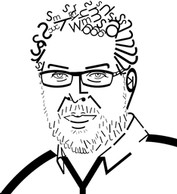FAITH + IDEAS =: last updated 10/28/2013
Faith +Ideas= an e-conversation with the Faculty of Gordon College
By Damon DiMauro
By every barometer, the recent opening of a “bistro” in the college library where I teach has been a boon to the new campus vibe. Students vote with their feet and, given the stampede, if ever there were any doubting Thomases, there is nothing like the terse rhetoric of success to sway naysayers. Moreover, with the library now all afroth adays and anights, the press releases have ebulliently ballyhooed, and justifiably so, the great “sea-change” in library vision—less quiet and quiescent “warehouse,” more clanky and collaborative “workshop”—since, as the current catchphrase would have it, “learning is social.”
It is not within my purview to publically pine—Gimme that old-time library!—however cathartic it might prove, for a world that has passed me by. I also need no arm-twisting to capeesh that stretched resources and restricted space require excruciating decisions at times. If I enter the lists and break a lance with Progress, it’s because I feel impelled to defend, as De Gaulle once said of France, une certaine idée de la bibliothèque, even if it’s only my own idée fixe. I have no other credentials than my dubious status as an inveterate research rat, unrepentant book junkie, and wannabe library groupie.
To cut to the chase, over against the social-driven model of learning, whatever validity it may have, I’d contend for that necessary ingredient in learning which is not social, nay which is essentially solitary, personal, and self-generated, but which is to learning what carbonization is to a beverage that would otherwise be flat. That ingredient is curiosity. While curiosity may be whetted or piqued, it can never be instilled or inculcated. For better or for worse, the curious are always self-selected scholars in their own private Academy, where the learning is self-motivated and the lessons self-taught.
For the curious, traditional library collections have ever been the privileged locus of unfettered investigation. Nothing dilates the soul more than to simply browse the stacks. Some of the most meaningful works I’ve ever perused or pondered were plucked from shelves during an idle stroll. All it takes is a little wondering while one wanders, and one finds oneself wandering more and finding more wonder.
Behind every book, too, is a mind, and sometimes generations of readers, through their marginal notations, have left traces of their own encounters with that mind. Felix culpa! Some books just look, for lack of a better word, lonely, and need a friend.
Some books really do become friends. Which is why it still sticks in my craw that X number of years ago, some library holdings not checked out in X number of years were pulled and whisked to storage. For this bibliolater, the move represented a loss of habitat, much as a botanist might regard a receding rain forest whose medicinal plants become extinct even before they’re discovered. I’ll never know which work might have worked in me weal for my woe.
Alas, curiosity gets a bum rap in popular culture. For starters, it’s a cat-killer, and not even the most partial dog lover wants to see the untimely demise of a creature capable of nine lives. Not only felines, but simians, too, by George, find themselves ensnared in its coils. Throughout Church History as well, curiosity has been in bad odor, often linked to excessive speculation. Saint Augustine, for instance, identified curiosity with the concupiscentia oculorum, though, based on his Confessions, the Bishop of Hippo seemed to have an “issue” in that department—and when one Church Father has a besetting sin, then all Christendom bears his cross.
A truce to Patristic guilt-tripping. Curiosity properly belongs to Integration of Faith 101: Dig, and you will discover! Research, and it will be revealed to you! Explore, and you will be elucidated! Yea, verily, verily, curiosity could well be christened one of the most Christian of non-Christian virtues! And why not? Understanding must be faithfully sought, even freely so, albeit within a certain framework. Gazing can be good (pace Hippo’s humbug), only, for curiosity’s sake, the operative organ is olfactory. He who has a nose, let him snoop!
On a practical level, curiosity helps to hone intuition, for, according to John Dewey, who, though a High Priest of Heathendom, must be forgiven when he opines aright, curiosity is “the feeling, however dim, that the facts which directly meet the senses are not the whole story.” Now, intuition when cultivated leads to the delight of discovery. Delight, in turn, begets delight, since discoveries tend to come in series (according to the principle: “for to everyone who discovers will more be revealed”). Finally, the unforeseen chain of discovery results in a kind of affection for things formerly dismissed as either too arcane or too mundane, but which now somehow come to texture existence itself and thus to be deemed worth cherishing.
Makeovers, however improving in the end, are rarely without some sense of loss. More library “social space” can mean less “quiet space.” In a kind of domino effect, new “quiet space” must be gerrymandered, which can deep-six underused and outdated materials. ‘Tis true, new technologies greatly expand the number of titles available, yet the overlap with older formats is not always entire. The curious might fret over his latte: Whither the collection in this age of triage?
Damon DiMauro is professor of French and Italian at Gordon College in Wenham, MA. He and his family live in Haverhill, MA.
